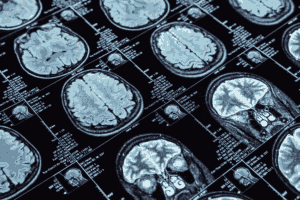Anxious depression represents a complex interplay of symptoms where anxiety and depression coexist, presenting unique challenges in treatment. This blog delves into how Transcranial Magnetic Stimulation (TMS) therapy can effectively address anxious depression, explaining its mechanisms, candidacy, effectiveness, benefits, risks, and comparisons with other treatment modalities.
Understanding Anxious Depression
Anxious depression, also known as mixed depression or comorbid anxiety and depression, manifests with symptoms of both anxiety and depression simultaneously. Individuals may experience persistent feelings of sadness, hopelessness, and low mood typical of depression, coupled with excessive worry, restlessness, and fear characteristic of anxiety disorders like generalized anxiety disorder (GAD) or social anxiety disorder (SAD).
How It Differs from Other Types of Depression
Anxious depression differs from other types of depression primarily due to the presence of significant anxiety symptoms alongside depressive symptoms. This dual diagnosis can complicate treatment approaches, as effectively addressing both sets of symptoms is crucial for therapeutic success.
Explanation of Transcranial Magnetic Stimulation (TMS)
Transcranial Magnetic Stimulation (TMS) is a non-invasive procedure that uses magnetic pulses to stimulate specific regions of the brain associated with mood regulation. During TMS therapy sessions, a magnetic coil is placed against the scalp, delivering targeted pulses that induce electrical currents in the brain. These currents modulate neuronal activity, promoting changes in brain function believed to alleviate symptoms of depression and anxiety.
Who Is a Good Candidate for TMS?
Good candidates for TMS therapy include individuals diagnosed with anxious depression who have not responded adequately to antidepressant medications or prefer non-medication treatment options. Candidates should generally be in good physical health, without contraindications such as implanted metallic devices or a history of seizures.
Effectiveness of TMS Therapy for Anxious Depression
Research supports the effectiveness of TMS therapy for treating anxious depression. By targeting neural pathways implicated in both anxiety and depression, TMS can help reduce symptoms and improve overall mental well-being. Many individuals experience significant relief, with some achieving remission from symptoms after completing a course of TMS sessions. rTMS treatment for anxiety involves delivering magnetic pulses to the brain, which helps modulate neuronal activity and potentially disrupts dysfunctional circuits contributing to anxiety disorders. rTMS has been studied for its effectiveness in reducing anxiety symptoms, offering a promising alternative for individuals seeking non-medication options to manage their anxiety associated with depression.

Potential Benefits and Risks of TMS for Anxious Depression
Benefits
- Non-invasive: TMS does not require surgery or anesthesia, making it a safer alternative to invasive treatments.
- Well-tolerated: Most patients tolerate TMS well, with minimal side effects during and after treatment.
- Effective: TMS has demonstrated efficacy in reducing symptoms of both anxiety and depression, offering a comprehensive treatment approach.
Risks
- Headache: Mild headaches may occur during or after TMS sessions but typically subside quickly.
- Scalp Discomfort: Some individuals may experience discomfort or irritation at the stimulation site.
- Tingling Sensation: Sensations of tingling or twitching in facial muscles may occur due to nerve stimulation.
- Lightheadedness: Temporary lightheadedness or dizziness can occur immediately following TMS sessions.
- Seizures: While rare, there is a small risk of seizures associated with TMS, particularly in individuals with a history of epilepsy or a predisposition to seizures.
Comparing TMS to Other Treatments for Anxious Depression
Compared to traditional antidepressant medications, TMS offers several advantages for treating anxious depression. It targets specific brain regions implicated in mood regulation without the systemic side effects often associated with medications. Additionally, TMS can be a suitable alternative for individuals who have not responded well to pharmacotherapy or who prefer non-medication treatment options.
Experience the Difference at Salience Neuro
At Salience Neuro, we specialize in providing personalized TMS therapy for anxious depression. We help individuals regain control of their mental health and improve their quality of life. Our expert team is dedicated to delivering compassionate care and effective treatment plans tailored to each patient’s unique needs.
Conclusion
Transcranial Magnetic Stimulation (TMS) therapy offers a promising treatment option for individuals struggling with anxious depression, addressing both depressive and anxiety symptoms through non-invasive brain stimulation. Individuals can make informed decisions about their mental health treatment by understanding the mechanisms, candidacy criteria, effectiveness, benefits, and potential risks associated with TMS. If you’re seeking therapy for anxiety in Houston and Dallas, consider exploring TMS therapy at Salience Neuro to experience a transformative approach to mental health care.
Frequently Asked Questions
The success rate of TMS (Transcranial Magnetic Stimulation) for anxiety associated with depression can vary depending on the individual's specific condition, severity of symptoms, and response to treatment. While research is ongoing, studies suggest that TMS may significantly reduce symptoms of anxiety disorders, including generalized anxiety disorder (GAD) and social anxiety disorder (SAD), in a substantial number of patients. Success rates are generally reported to be comparable to those seen in the treatment of depression with TMS.
See If TMS Therapy Is Right For You
Schedule Your Consultation Today


